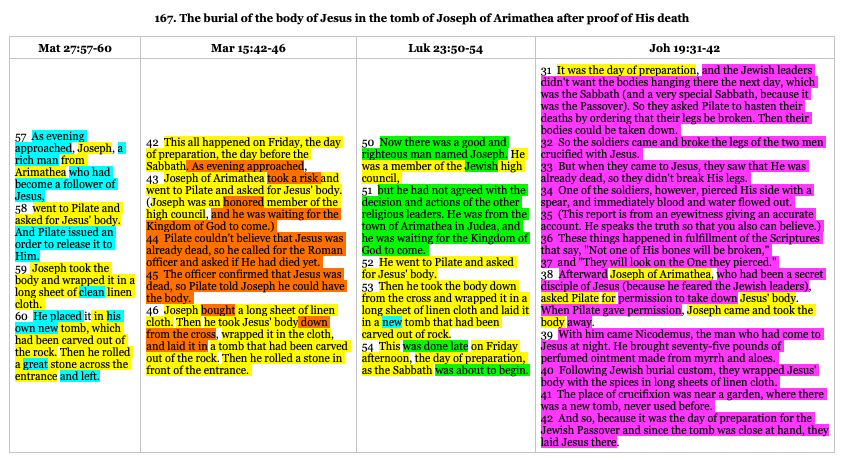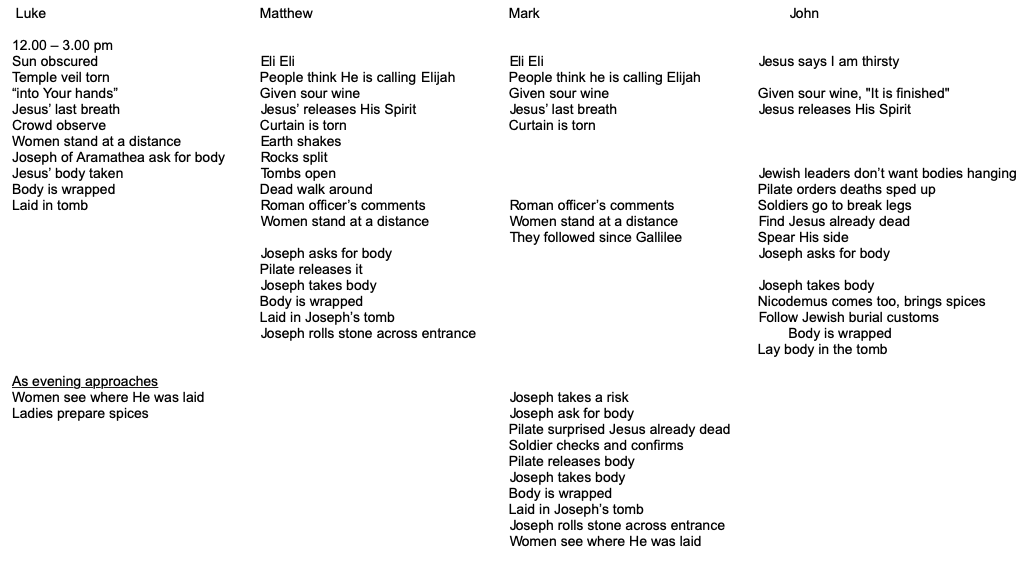It was now about the sixth hour, and darkness fell over the whole land until the ninth hour, because the sun was obscured; and the veil of the temple was torn in two. And Jesus, crying out with a loud voice, said, “Father, INTO YOUR HANDS I COMMIT MY SPIRIT.” Having said this, He breathed His last. Now when the centurion saw what had happened, he began praising God, saying, “Certainly this man was innocent.” And all the crowds who came together for this spectacle, when they observed what had happened, began to return, beating their breasts. And all His acquaintances and the women who accompanied Him from Galilee were standing at a distance, seeing these things. And a man named Joseph, who was a member of the Council, a good and righteous man (he had not consented to their plan and action),a man from Arimathea, a city of the Jews, who was waiting for the kingdom of God; this man went to Pilate and asked for the body of Jesus. And he took it down and wrapped it in a linen cloth, and laid Him in a tomb cut into the rock, where no one had ever lain. It was the preparation day, and the Sabbath was about to begin. Now the women who had come with Him out of Galilee followed, and saw the tomb and how His body was laid. Then they returned and prepared spices and perfumes. And on the Sabbath they rested according to the commandment.
Luke 23:44-56
- Shared
- Uniquely Matthew
- Uniquely Mark
- Uniquely Luke
- Uniquely John
I titled the Gems before this “What happened in the darkness?” So what did happen in the darkness? Most of the action described in the harmonised segments above happened in the darkness. Interesting isn’t it? Clearly we need all gospel accounts to piece together the full story. What is apparent from the harmonised segments above is that each writer is focused on sharing what he wants to share. The stories vary with each telling. Some elements are omitted in the writer’s attempt to communicate what is important to him. That is normal in the telling of any story actually. But in this case it is clear that each of these gospel writers has a theme or a main point they are seeking to convey. What is even more apparent, as we have seen before, despite the fact that Luke is writing an ordered, well researched account of the events of the Good News (Gospel) of Jesus, he omits a lot of the oral story or he reorders it to suit his own purposes. Why would he do that? I leave you with that question to ponder.
I have told you before that you need to pay attention to the full story in order to understand the events that took place. Not only to understand the big picture of the events but also to see clearly what Luke has omitted and what he has included. Here is a summary to help you:
When you look over the pieces Luke omitted there are some surprising elements of the story that I would expect him to have included because they seem to fit with the rest of Luke’s story. But no, he omitted them. Think about why! I imagine too like me, looking at all four stories in harmony like this at times leave you with more questions than answers. Is that right? Has this exercise sparked questions in your mind?
First we look at the big picture and then I intend to work through each of the segments. I would suggest you make a list of the questions that have come to your mind. If you really want answers to them then share your questions with me. I will give you a list of my questions in the next Gem. If there are questions that come to your mind that I haven’t added to my list, tell me. I won’t guarantee to cover every single question that Gem readers contribute but I will certainly address the main ones. Let’s see where this takes us. We will work our way through the above harmonised segments one by one. There are some classic issues that are buried among the segments.
Also don’t be fooled by the fact that I have arranged them in these harmonised units. Luke certainly didn’t do that. Luke’s coverage here is combined in one unit. I have simply followed the lead of Robertson’s Harmony in order to bring the fuller picture to you. But there are some interesting things which arise from doing that. You will see some common threads coming through the gospel accounts but you will also see some very significant differences. Ask yourself why does each writer handle the material as they do. You will also notice that Luke deviates substantially from the others are his account develops. As I have told you before I am more interested in Luke’s account at this stage. You will have to put the pieces together to find the purpose of the other writers. But I will address some of the issues that arise during our comparison.
In the meantime be gathering your wits and your questions.
You are of immense value. God made you and God doesn’t make junk. God died for you and He didn’t die for nothing.
Anon
If you are lucky enough to find a way of life you love, you have to find the courage to live it.
John Irving
Our greatest fear should not be of failure, but of succeeding at things in life that don’t really matter.
Anon
We often call on God to ease our pain without wanting Him to change our character.
A R Bernard





